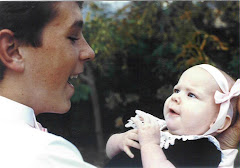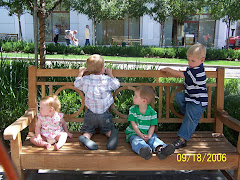Our older children often joke about “emotional scars” they received during their growing up years in our home. Whenever we get together they enjoy reminiscing about their memories and poking fun at our parenting. I just hope, deep down, that I have been able to raise my children to adulthood without too much trauma to their personalities. The only scar to which I’ll admit taking blame for is the male pattern baldness gene that they got from my Grandmother’s father which really is so far removed from me that it shouldn’t matter. Nevertheless, we all need to blame our faults on someone so my broad shoulders will bear that burden. Every time baldness is brought up I do remind my sons that they all had a full head of hair until they left home.
Seriously, one scar that I never wanted my children to have was low self-esteem. I’ve seen the abuse inflicted upon some children as their mother belittled and humiliated them in public, My heart would ache as I wished I could take those children home with me and love them. I never wanted my children to feel that kind of humiliation.
Each child’s personality is so different and is often a difficult struggle to find out what positive reinforcement approach works. No matter what I did some of my children still had struggles developing a good self-image. I wonder if this is more the rule than the exception in their path to adulthood. Being noticed in a positive way brings a sense of reward and gratification and aids in self-perception. The road to good self-esteem is an individual journey with both cheering and jeering from the sidelines. The important point is to protect against those negative comments coming from the sidelines and then helping them internalize the positive ones.
I read a great book several years ago that helped me to understand this concept. The title is, What to Say When You Talk to Yourself by Shad Helmstetter. I would highly recommend this book if you have a child with self-defeating behavioral patterns. The main concept of the book promotes replacing the many negative thoughts you tell yourself each day and changing them to positive thoughts. For example, don’t say, “Today was a rough day.” Change your thoughts to “So many good things happened today.”
A secret I have learned is…Tell your child he is what you want him to become! For instance, “John, I’m impressed that you have managed your time so wisely today.” In reality, he may not be very good at his time management skills but he will tell himself, “Mom thinks I manage my time well so I guess I do.” The more he thinks about this reinforcement and confirms within himself positive thoughts the more he will become aware of his time and mange it better. I don’t feel this is a “little white lie” but an approach to correct a child’s behavior. With so much negative out there we as mothers need to be the positive force behind their self-image. Self-confidence is produced just as it is stated…Self…A child becomes what they are told they are and what they tell themselves they are. It doesn’t take a doctorate degree in Child Development to come to this conclusion or to help your child overcome self-doubt. It takes love, patience and a lot of positive reinforcement.
Once reading in Isaiah 61:3 the phrase “the garment of praise” caught my attention causing me to ponder and reflect on its meaning. As mothers we make sure our children are properly clothed and fed, taught personal hygiene, and that they learn proper manners and etiquette so society will accept them. But what about clothing them with daily praise as they live in your home so they will accept themselves? As they learn they become more self-confident rather than peer-confident.
Years ago I read a study that revealed when a child leaves home for the day he receives at least five negative comments about himself from other people before the first recess at school. How important is it that we reinforce their positive image at home? Very important! No one really cares about your child with the same interest or intensity as their mother. Only rarely do you find a teacher or friend who has the same concern about your child as you do. You are the one who cheers the loudest from that sideline on his journey to self-confidence. It is your voice he hears the loudest.
If you listen to your children you can tell how they feel about themselves. They will give you both negative and positive feedback clues. How many times have you heard some of these comments? “I didn’t have any fiends to play with today.” Or “I had the best time at recess.” or “My classes are to hard.” or “My teacher told me today that I read very well.” These statements and others like them, reflect their inner self-perception allowing you, their mother, to gauge their self-image.
As they grow older the nature of their comments change but not their subtle meaning. They are telling you how they feel the world sees them and also how they perceive themselves as an individual. We need to listen and help them sift though all the comments they hear and teach them to eliminate the negative and internalize the positive. Internalizing everyone’s comments thought-out his life your child starts to tell himself who he is and those thought make him the persona he really becomes.
Hopefully, your child grown to adulthood will be able to look at his thinning hairline and realize that one’s character is not judged by the thickness of hair. This will mean that self-confidence has truly been achieved.
















No comments:
Post a Comment